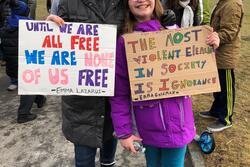I Will Not Hide my Judaism in Progressive Spaces
I have a confession.
I’ve often hidden my Judaism, particularly in progressive and feminist spaces.
This hiding and erasure of a part of myself in spaces that are supposed to be accepting, healing sources of community, has been intense emotional labor.
So, today I am coming out; no more hiding. Hiding Judaism, after all, recreates the generational trauma that Jews have experienced in previous generations. In naming the nuances of my Jewish experience, I hope that other progressive and feminist Jews feel seen, supported, and empowered to share their full selves.
I have often seen representation of Judaism reduced to the Israeli-Palestinian conflict, including in progressive and feminist spaces. (For the purposes of this piece, “progressive and feminist spaces” includes collectives/organizations and even some workplaces, as well as social justice online communities and discussions.)
In fact, my inspiration for this piece came after I saw “Jewish women” mentioned in the newsletter of a feminist organization I’m involved with. I was excited; other than in reference to Palestinian-Israeli conflict, I had never seen the word “Jewish” in any of their communications. But my excitement quickly evaporated when I saw that this was, in fact, an article on the conflict, in support of anti-Zionist Jewish women.
This is something I have experienced more times than I can count: Judaism is only mentioned in the context of a political standpoint on the Israel-Palestine conflict. It often feels like Jewish identity is reduced to no more than a tool to show, “See, there are Jews that support our side.” This false binary of “good Jews” (read: anti-Zionist) or “bad Jews” (read: Zionist, institutionalized oppressor) puts many of us into boxes that don’t fit us and fuels antisemitism by essentializing Jewish identity.
My experiences with this dynamic range from subtle to overt. One memorable example happened years ago, when I was in university and a member of a human rights group. When the group invited a radical anti-zionist activist as a speaker on the topic of “Israeli apartheid,” I suggested adding someone else to provide nuance and balance the discussion, particularly in relation to the use of the term “apartheid.” I received an outright “no,” along with an email noting that my suggestions had no place in this space.
I am not alone. This is something other Jewish students experience on college campuses. Many of us may also remember the schism with Jewish women at the 2019 Women's March, in which board members posted on Instagram photos of themselves with the Nation of Islam leader, Louis Farrakhan, known for his antisemitic remarks, including at an event where he said that “the powerful Jews are my enemy.” One of the board members also shared a Facebook post that drew links between the rhetoric of the “American Jewish Establishment” and a shooting at a New Zealand mosque that killed 51 people.
When progressive and feminist friends box us into binaries such that any support for the existence of the state of Israel is framed as oppression and colonialism—without any acknowledgment that Israel is simultaneously experienced as a historical homeland for many Jews, and as a space of life-saving safety for many—this erases history. It also erases me and so many other Jewish women, who want Jews to continue to live freely in Israel and also believe that Palestinians should have equal rights. As noted by Rabbi Danya Ruttenberg, people like us have no place in this binary.
Don’t get me wrong: I believe there is and should be room for challenging conversation and debate about Israel, and I don’t see criticism of Israel, or even anti-Zionism, as inherently antisemitic. But critique of specific policy is one thing; blanket statements against Israel, with no room for discussion, are another. I often wish anti-Zionist folks did their homework on the conflict and reflected on their “why” before getting involved in or posting on social media about this debate.
Criticism of Israel is also sometimes used as a cover for antisemitic beliefs and actions. After all, antisemitism often manifests itself covertly, and can pop up in even the most progressive circles. It may look like people saying that all Jews are rich, part of the “establishment,” or “control the media,” and therefore can’t experience oppression, or that Jews need to pass a litmus test about Israel-Palestine before speaking out about antisemitism (see this helpful infographic by Liz Sohyeon Kleinrock). When a Jew says that some criticism of Israel is antisemitic and is told that no, that is never the case, that is gaslighting.
I also want my progressive and feminist friends to know that my lived Judaism informs my feminist and progressive values. I follow in the footsteps of Jewish women before me who fuel my work in social justice: trailblazers like Ruth Bader Ginsburg, and the Jane Collective. I’m inspired by Jewish feminists who have fought and continue to fight for abortion rights in the aftermath of the overturning of Roe v. Wade.
My Judaism shows up every day in my sexual violence prevention and diversity, equity, and inclusion work, following the principle of tikkun olam, the Jewish responsibility to repair the world through social action. The feminist bell hooks is also a source of inspiration; her words “Love is an action, never just a feeling” align with Judaism’s central goal to live in the image of the divine through action, rather than only through beliefs.
My Jewish progressive values show up in the heart-and human-centred approach I take in my work, inspired by the modern Mussar movement, a Jewish spiritual practice that incorporates mindfulness and meditation to develop character traits like gratitude, compassion, truth, generosity, accountability, and dignity.
I am also inspired by the work of progressive Jewish organizations and content creators including Repair the World, David Jaffe, Kendell Pinkney, April N. Baskin, Mitsui Collective, and Tony Westbrook Jr.
As these Jewish thinkers show, Jewish life and identity are rich and diverse; it’s not all about Israel. And when it comes to Israel, Jews experience and relate to it differently based on their backgrounds and beliefs. As with other facets of Jewish identity, there is diversity and nuance here, too.
As a survivor of complex trauma and violence, like many women, I have had the experience of having my agency taken away, of others imposing their reality and defining my identity. The lack of representation of Jewish diversity and boxing me into false binaries reinforces this feeling.
It’s time for a change.
As a first step, I invite more Jewish women and people of all genders to name and own their Judaism as part of their social justice work.
Here are other steps progressive Jews can take:
- Challenge antisemitic and essentializing assumptions within ourselves, our community, and the spaces in which we work and live.
- Connect with other progressive feminist Jews— we’re out there! The Jewish Women’s Archive is a source of community and learning about other such networks.
- Read and amplify the work of diverse Jewish voices such as those I’ve mentioned.
Let us raise our voices and create change together.








This is strongly written and I see my full self and my work achieving justice in your words. Thank you for naming the binary so many Jews feel caught in. The litmus test in progressive politics is exhausting and keeping the left so fractured.
In reply to This is strongly written and… by Yael Silverber…
Yael, thank you for commenting! It is so heartwarming to hear your words, and the impact mine had on you! I am with you in solidarity, let's keep on sharing this message and resisting narratives and binaries imposed upon us! Cheers, Adriana